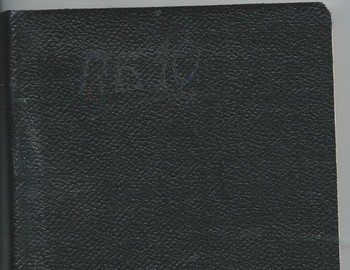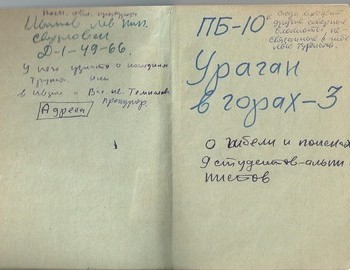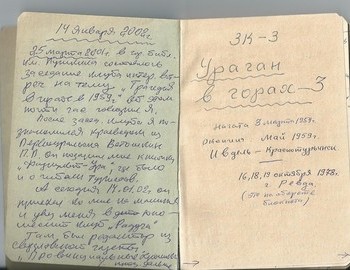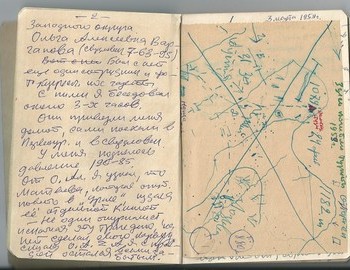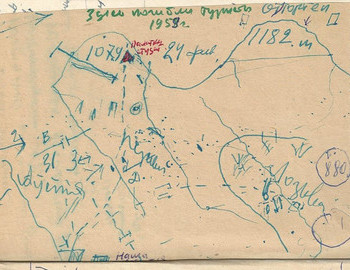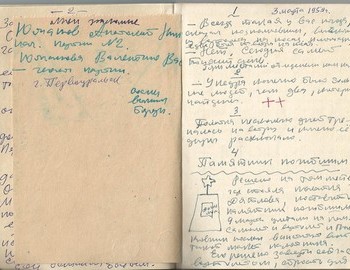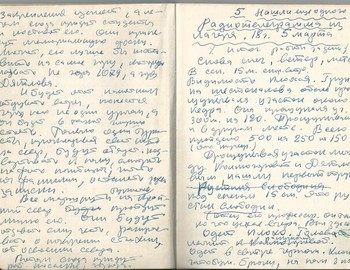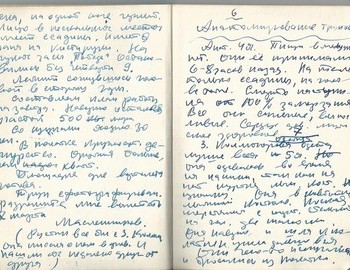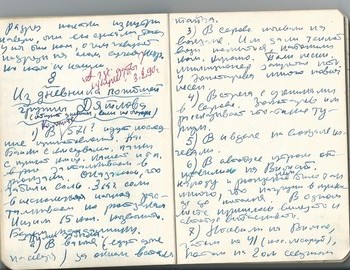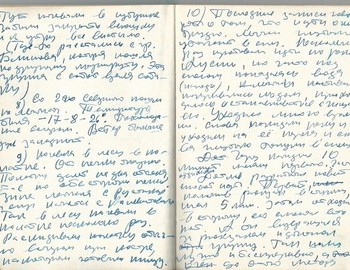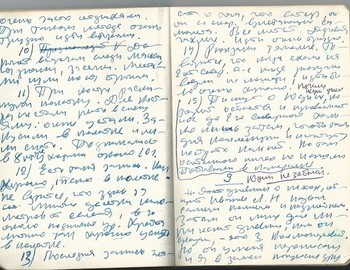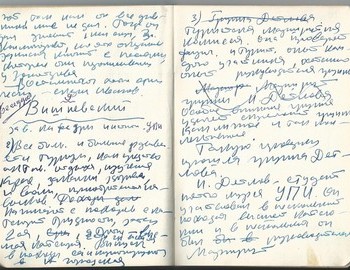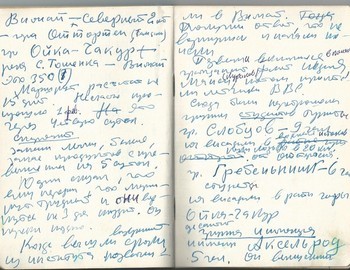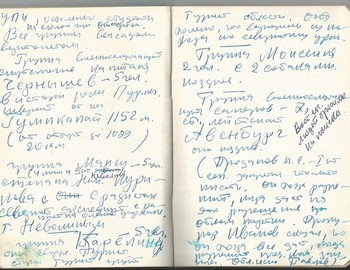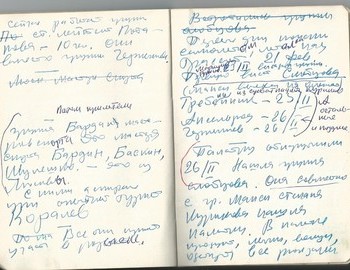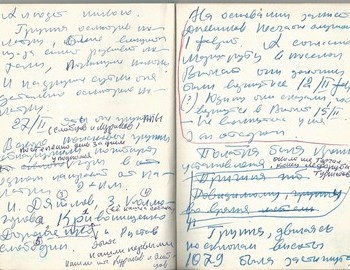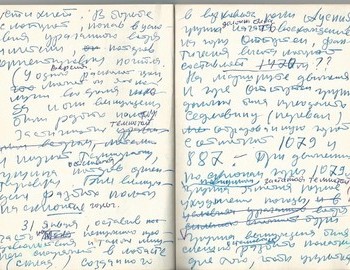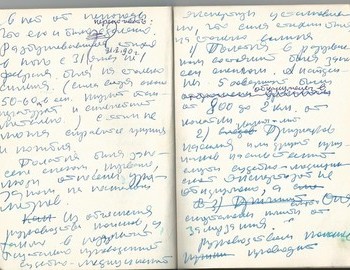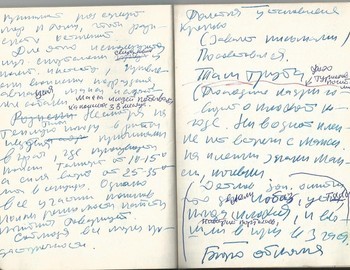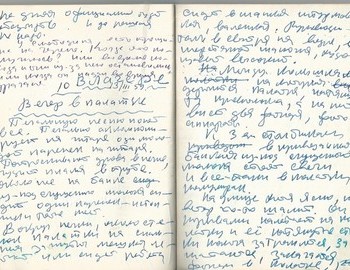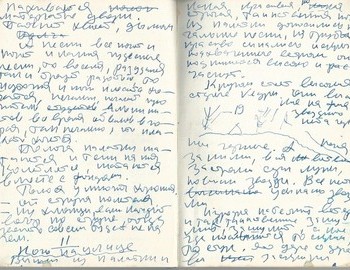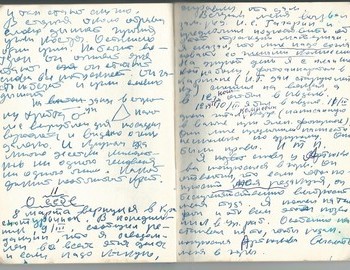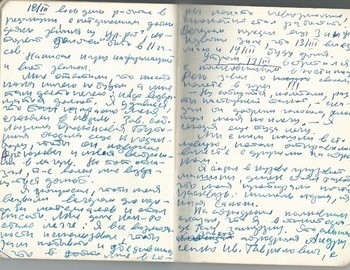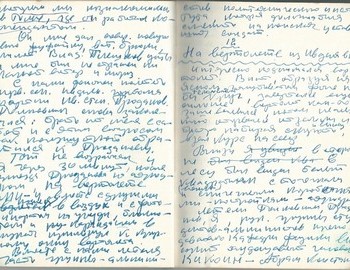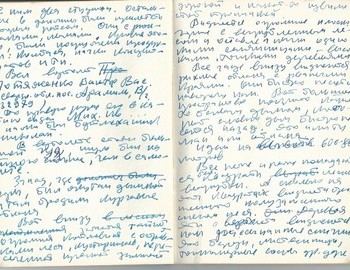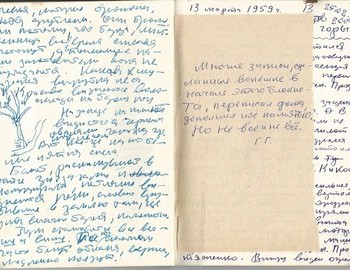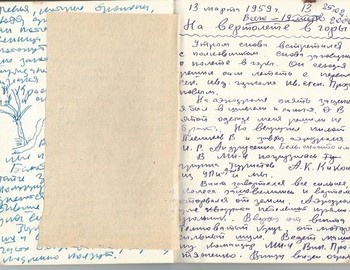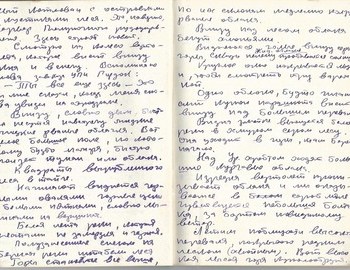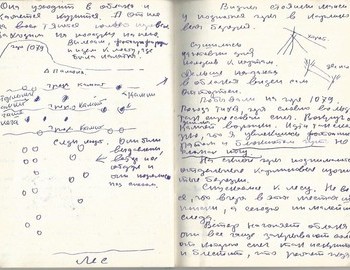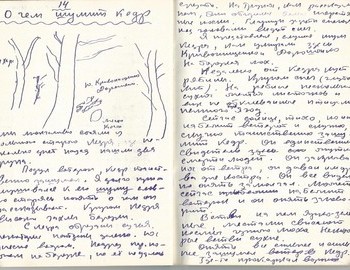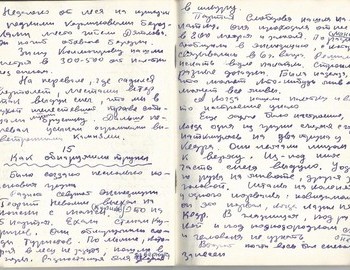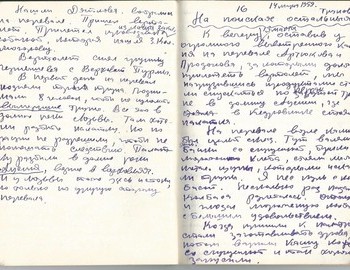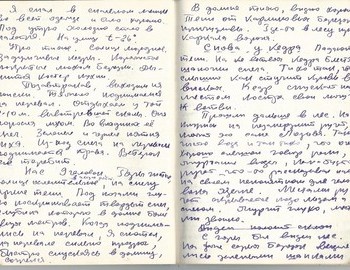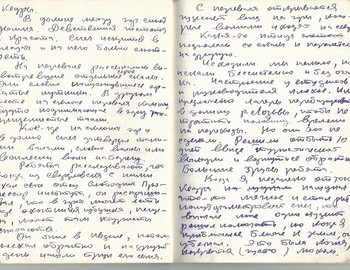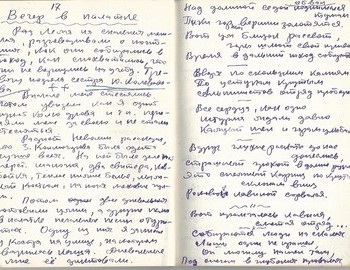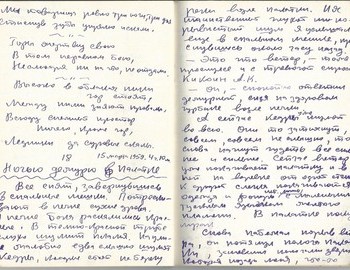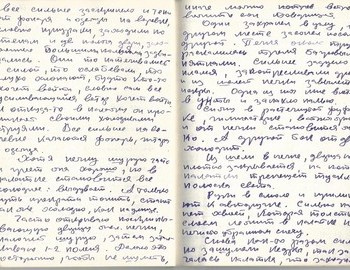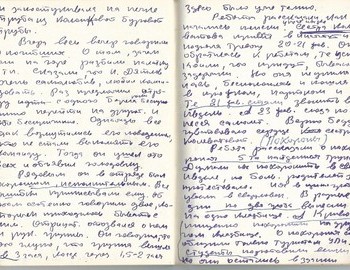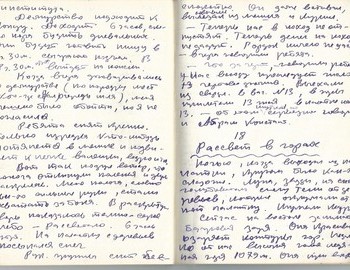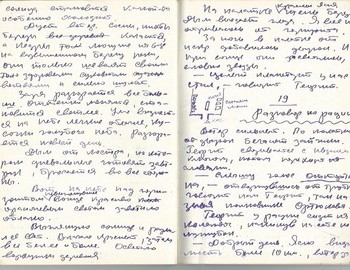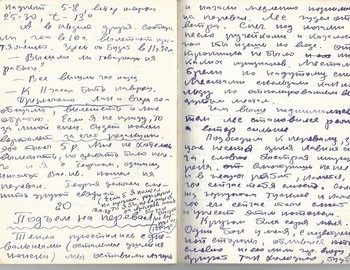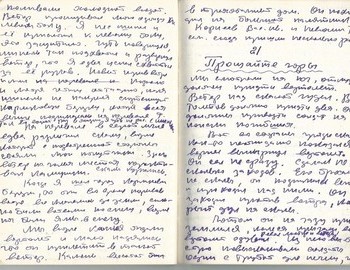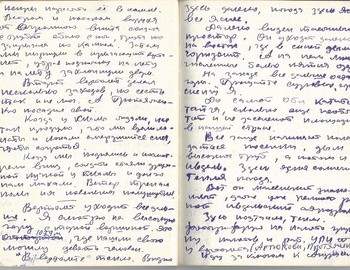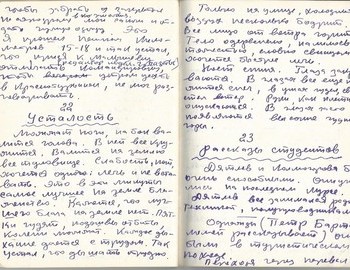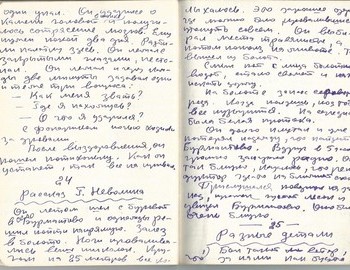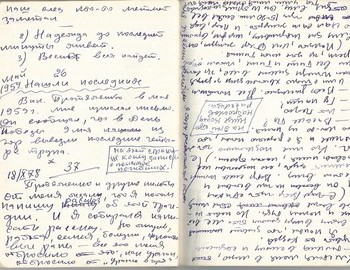
G. K. Grigoriev "Snowstorm in the Mountains" - 3
Notebook - 10
(cover)
assistant to the regional prosecutor Lev Nikolaevich Ivanov Sverdlovsk D-1-49-66. Find out from him about the last bodies. Or in Ivdel from Vasiliy Ivanovich Tempalov. Address.
Notebook - 10
This includes other northern notebooks not related to the deaths of hikers.
Vol-3 Snowstorm in the Mountains - 3
On the deaths and search of the 9 students-alpinists
14 January 2002
25 March 2001 in the city library named after Pushkin held interesting meeting in the club on the topic "Tragedy in the mountains in 1959". I talked about this for almost an hour. After the meeting of the club I met with local historian from Pervouralsk P.V. Vetoshkin. He gave me a book "Fizkult-Ura" [en. - physical training, word play - the last 3 letters mean Hurrah], which was about the death of the hikers. And today, 14 January 2002 he came to me in a car and took me to the youth club "Raduga" [en. - Rainbow]. There was an editor from the Sverdlovsk newspaper "Provintsialniye Hrokiki" [en. - Provincial Chronicles] (cont. further)
Part - 3
Snowstorm in the Mountains - 3
Started: 3 March 1959;
finished: May 1959
Ivdel-Krasnoturinsk
----------------------
16, 18, 19 October 1978
city of Revda
(this is on the back of a notebook)
-2- [continued notes from 2002:] Western District Olga Alekseevna Varganova (Sverdlovsk 7-63-95) I was with her and another journalist and photo correspondent of their newspaper. I talked with them for about 3 hours. They brought me home, they drove to Pervouralsk and Sverdlovsk themselves. My pressure rose 190-85. From Olga Alekseevna I found out that Matveeva, who published the story in Ural, released it as a separate book.
- Many journalist distorted this tragedy and made careers from it, Olga Alekseevna said. And I, truthfully, remained all forgotten.
[here the hikers died in 1959 cleaned map form scan 4]
My acquaintances: Anatoliy Nickolaevich Yuzhanov party leader №2. Valentina Vasiliyevich Yuzhanova - party geologist
Pervouralsk
Sosva(?)
Vishera(?)
Berezniki(?)
3 March 1959
(1) - Is the weather always like this, said the lieutenant colonel, getting out (?) from the helicopter to the landing site, barely standing on the ground against the wind.
- No. Today is the most (???) day. Mountains icy in places like stone.
(2) - At the cedar were certainly more people than the two that were found. ++
(3) The tent fluttered for several days in the wind, and of course it (???) popped open.
(4) Monument to the dead [see drawing on scan 5]
It was decided to erect a monument to the dead on the spot where the Dyatlov tent stood. March 4, flew for the monument. A plane and a helicopter and a colonel sent such a model of the monument to the institute to prep(?). It was decided to deliver it now by helicopter, drop it for
mounting, and in the summer students will come here and cement it. They will bring a plaque. Maybe it would be better to put it on the mountain, and instead of 1079 name it Mt Dyatlov. And this monument will be blown by many winds, more than one storm will rush through it, and it will stand in such a wilderness. Hiking making their way to the North, will be sure to turn up to it, look at the photos of the dead, read their names, leave notes here. All hiking routes to the far North will pass by the monument. Travelers will salute, various news about the conquest of the elements, the development of the north. Then here will appear the first work class villages, cities.
(5) Found one more. Radio telegram from the camp. 6:00pm March 5
/ the result for the day./
Again snow, wind, blizzard. At (??) 15m wind speed. Visibility is poor. Shestopalov group probed areas near the cedar. She covered area 300m x 120. Probed on other places too. A total of 500 x 250 x 150 was completed (this is a triangle). Probed the area between Kolmogorova and Dyatlov, we found the first corpse under the snow 15cm. This is Rustic Slobodin. (His father is a professor, he just left yesterday. He was here). Badly dressed. The head lies to Kolmogorova (???). Dressed in sweater. He is wearing cotton pants, 3 so
cks, black on one foot. The face has abrasions in several places. There is a wound on his wrist. He is wearing "Pobeda" watch. Stopped at 8:45. Lies with his head bent towards the mountain. A work plan has been drawn up for tomorrow. Probably there was an area of 500 m left. 30 people walked with probes. In the tent there are attendants round the clock. Weapons are more than enough. The helicopter landing site is ready. The body is photographed. Requesting permission to leave on March 7. Maslennikov.
(Rustic was(?) with Z. Kolmogorova all the time. She wrote about him in a diary. And found them not far from each other.)
(6) Anatomy of corpses. Anat. 4. There is no food in the stomach. They ate it 6-8 hours before dying. There are only abrasions on the body, on the head too. Death came from 100% freezing. All of them are strong, in good shape. Their hearts are healthy.
(7) Clothing. Kolmogorova is the best dressed from all 5. She dressed during their panic, as she wears a ski jacket although(?) inside out. She is in a checkered shirt, ski suit, (???) woolen (?) with woolen (?) insole, two caps on the head. She probably went to the tent and went farthest of all. They were frightened of something and rushed out of the tent.
The tent was cut from inside. Probably they did it, they had a knife, we know that because of the branches that were cut under of cedar. The knife was never found though.
(8) From the diary of the dead Dyatlov group (group diary, they took turns to write)
where are the dates (???)? 3.2.1990
- In room 571? final preparations are in progress. Canned food, packs with cereal (???) porridge, etc. we push in backpacks. It turned out that we forgot the salt. We put in the backpacks 3kg of salt in several bags. We are looking for 15 kopeek to call. Taking the mandolin.
- Forgot the felt boots. - In the carriage (already going north), the taiga extended outside the window.
- In Serov they spent the night at the train station. They were given warm water to drunk, and heated the room well. They sang songs. The policeman forbade singing. Zolotaryov has a lot of new songs.
- Meeting with pupils in Serov. Zolotaryov gives a speech about mountaineering.
- In Ivdel, we spent the night at the station.
- Took the bus in the morning to Vizhay. There were so many people and backpacks, skis, that they crowded the aisle to the ceiling. In one place I had to get out and pull out the bus.
- They spent a night in Vizhay, then in 41 (the logging village), then in the 2nd Northern.
They spent the night in a hut, forgot to close the window, and by morning everything was cold. (Somewhere split with Blinov group, who went on a different route. That group took a dog with them.)
- They started skiing from the 2nd Northern. The temperature was -17-8-26°. Cooling in the evening. The wind blew mostly from the West.
- Overnight in the forest in a tent. It’s hot from the stove. The tent is divided into two compartments, i.e. on both sides of the stove. Zina was lying next to Rustik and a dispute (?) began with Kolevatov. This is how they spent several nights in the woods. They usually pitched the tent in the evening next to a campfire, on which they prepared food.
- Latest entries indicate that advancing is very difficult. Skis are constantly mounted with snow. They tried several times to go along the Auspiya river, but often water (ice) came under the snow, the skis were constantly covered with ice. They had to stop scrape. It took a lot of time. They left the river again and went on the banks, and again sunk deep in the snow. Every 10 minutes they changed the first, often rested. Dyatlov developed a new way to go. The first, putting a backpack in the snow, walked 5min. Then he stepped aside, he was replaced by a second. And he came back for his backpack and caught up with the group. So they went better and continuously, before this method
very often rested. This method was hard on the second [hiker in line].
- Along their path they saw traces of Mansi, their signs, tree carvings. Partly they walked along their trails.
- They set the tent next to the camp fire. They didn’t dig a hole for the fire in the snow: they were very tired. They ate in a tent and went to bed. Got up at 8 then started around 10 am.
- There is record. How nice, warm in the tent. I can’t believe that here, for hundreds of kilometers from any village, near the foothills of the Ural Range, we can sleep so well in a tent.
- The last entry says that the wind is with the strength of plane jets. Everything is blown away. Trees are crooked. Walking is very difficult.
- Backpacks are heavy. It is said that when gong to the 2nd Northern, when the backpacks were pulled by a horse, it was much easier to walk!
- Why did Yudin leave [added] They write about Yudin, who goes with them to the 2nd Northern only to collect stones for the institute. But they didn’t find anything interesting. They visited the mine shaft.
(9) Yudin did not get sick [added] This diary is about the trek, belongs to the whole group, L.N. Ivanov said, it is the most complete and detailed. Then he gave me a handwritten diary, and said - this belongs to Z. Kolmogorova. But already copied this one and asked for ano
ther in exchange, since he did not give me all the diaries. Then he gave me another diary, he said it belong(?) to Z. Kolmogorova, but it turned out to be a notebook with songs that they copied from Zolotaryov.
- Copy(?) at least one song - said Ivanov
(9) Conversation. Vishnevskiy
Head Department of UPI
Hiking is developing more and more as a means of outdoor activities, exploring the region, training health and will, and acquiring skills. It starts with hiking in the category 1st of difficulty, then the 2nd. The 3rd is the highest category. There is (???). Camping is authorized by the city hiking route commission. They checks the physical condition and qualification of each participant, especially the experience of the group leader. The group pays special attention to the equipment (?) of the group, both personal and communal. The Dyatlov group passed this test.
I. Dyatlov - fifth year student of UPI. He participated in several expeditions of the highest category and in several he was the leader. Route
Vizhay - 2nd Northern - Mt Otorten (one day) - Mt Oyka-Chakur - N.Toshemka river - Vizhay. These are 350 [km]. The route is planned for 15 days. The tragedy happened on Feb 1. This is after four days in.
Equipment
spare(?) ski, linen, stock of products in excess of 5 days. Yudin said that he was told that the route is difficult and they will return 3 days later. He related this late. When the return dates came the institute called Vizhay. They got an answer that they [Dyatlov group] didn’t return and started looking for them. The first (?) to join the search was Ivdel civilian fleet, Mansi (Kurikov), then the Air Force pilots arrived. Groups of student hikers were brought: Slobtsov group - 9 people - they were dropped off at the upper sources of the Lozva river 20 km from Otorten; Grebennik group - 6 students - they were dropped off in the area of Mt Oyka-Chakur; group of engineers led by engineer Akselrod - 5 people. He is a graduate
of UPI, the rest are students - landed on the slopes of Mt Otorten. All groups landed by helicopters.
A group of military personnel athletes led by captain Chernyshev athletes - 5 people - to the source of the Purma river, to the north (?) from it Gumpkapay 1152m (from which to 1079 are 20km)
Mansi group - 5 people (4 Mansi and Nevolin) Stepan Nikolaevich Kurikov with with a walkie-talkie and a radio operator from the Northern Expedition comrade Nevolin on a reindeer sled
Karelin group - 5 people - experienced hikers from Sverdlovsk, senior mountaineers. They had just returned from an expedition in the Northern Urals.
Moiseev group - 2 people - with 2 dogs later
A group of servicemen sappers - 7 people - Senior Lieutenant Avenburg. They came later. Here is how many people were brought to the search.
(Ivan Stepanovich Prodanov - First Secretary forbade me to write anything. He will allow it when the regional party committee permits it. Prosecutor Ivanov said that he would then give me information when the Deputy Chairman of the Sverdlovsk Regional Executive Committee Pavlov says he can.)
Now works Seniour Lieutenant Potapov group - 10 people - they replaced Chernyshev's group. Then flew in: Bardin group - masters of sports. These are masters of sports Bardin, Baskin, Shuleshko - they are from Moscow. With them on duty (?) was Korolyov, an experienced hiker from UPI. All of them took part in the search.
On the first days of search, on February 21, airplanes flew over the route of the group. 23/II dropped off the first team - Slobtsov group. (Mansi Kurikov rode on deer from Suevatpaul). Grebennik - 25/II; Akselrod - 26/II; Chernyshev - 26/II. And the rest later.
The tent was found on 26/II by Slobtsov group. They found it together with Mansi Stepan Kurikov group. In the tent there were products, skis, personal effects, clothes, all backpacks.
There were no people. The group, having inspected the tent, was forced to leave the tent because of snow (???) them there. And on the other day she examined the tent in detail. 27/II the same groups (Slobtsov and Kurikov) in (???) search groups gradually found day after day those who died at the foot of the mountain in one direction from the tent 2+ km. I. Dyatlov (3), Z. Kolmogorova (4) (a dog found her), Krivonischenko (1), Doroshenko (2) (they were found first, Kurikov and Slobtsov found them) and Rustik Slobodin (5) Based on the diary entries the incident February 1. And according to the route to the village of Vizhay, they were supposed to return 12/II
(7) They told Yudin that they would return to Vizhay 15/II - do not worry(?) at (???) carefully(?)
The tent was firmly set up, close by was stuck the ice ax of the hikers. The group, moving along the slopes of a height of 1079, was caught by
elements. In the struggle with which, having fallen in conditions of a hurricane wind and blizzards, having lost orientation, they died.
(Version: one had a skull fracture, maybe he got it during the trek and they were forced to pitch a tent, caught in darkness and low temperature. The group stopped, losing orientation. They were forced to set a tent on the side of a mountain)
On January 31, leaving a part of unnecessary food and also extra equipment in the labaz (storage) dug in the upper sources of the Auspiya river, the group was supposed to start climbing Mt Otorten, the actual height of which is 1477m?? On the route to Mt Otorten, the group had to overcome a saddle (pass) formed by a mountain with a mark of 1079 and 887.
When moving along the slopes of Mount 1079, the group apparently close to darkness noticed a sudden deterioration in the weather. The group was forced to hastily stop, pitch a tent in order to take cover
in it from the weather. What they did. The raging elements on the night of January 31 to February 1 were so strong (?? 21.2.1990) (wind power of about 50-60 km per second. Low temperature and a strong snowstorm) the group could not cope with and died. The tent was covered with snow, torn, people carried by a hurricane winds several meters. From the explanation of the search leaders, as well as the result of a thorough forensic medical examination, it was established that the power of the elements was very strong.
- The tent in torn condition was covered with snow. And 5 comrades were found 800 to 2km from the tent
- No signs of violence or other signs of foul play were detected by the forensic medical examination, the athletes died from freezing. Search is conducted(???)
taking a series(???) of measures to find the rest. For this, the best athletes of Sverdlovsk and UPI are used, military units are involved, aviation, Mansi and service dogs. A lot of people went searching for 3 months. Despite the warm weather in the search area, the reasons are in the mountains(?). The search undergoes in temperatures from -10-15°, and the wind force is from 25-35 mps. However, all participants in the search are determined to find their dead comrades. Observing all safety precautions.
The tent is set firmly (got a lot of letters). Consulted.
There is a tube [he is talking about the winds]. The last shots (photos of the hikers who died) speak of bad weather. Not a single picture of meeting with Mansi. On the films are Mansi signs and camp sites. Dyatlov made mistakes that they made the storage, were tired, the weather was bad, probably got worse, and they started going up only at 3 o’clock. Bureau of the Regional Committee.
In days there will be an official ??? and before the decision is not necessary
Slobodin has a crack in the skull. When did it happen? Either during the trek and they stopped because of him, or when he fell during the snowstorm.
(10) In the camp 13 March 1959
Evening in the tent
Everyone sings a sad song. Sadly accompanies one young guy on a guitar. Firewood crackles in the stove, a flame in the chimney buzzes. Near by on a jar of condensed milk sits a young lad who feeds the fire and also sings. Around the stove, near the walls of the tent, the guys are lying or sitting on curled sleeping bags. They sit in hats, storm jackets, boots. The leader in a sweater sits on a bucket, in a woolen hat, thin, tall. Between the pegs on which the tent rests, a wire is stretched, and on it hang two flashlights, cameras. To the 3rd columns are tied cans of condensed milk with candles. Nevertheless, the tent is twilight.
Outside, although it is clear, the wind is unpleasant. It comes in gusts at the tent and its stretched walls of the canopy harden, tremble, lights in the tent swing.
Cloth doors swing open. Cold rushes in, smoke. And all the songs are sung and sung and such wonderful songs, some are happy, daring, and ??? joy then ??? then I want to cry? sad, sad about the death of hikers during the fall in the mountains. So sad that I want to cry. The canopy of the tent shake and the shadows on it hesitate, tremble along with the lights. Many of the voices are good.
- Oh, the string flew
- Well, lads, if every evening we lose a string, then there will be absolutely nothing to play on!
(11) Night outside
We went out of the tent and what a beautiful, but very strict, mysterious night. Sad songs came from the tent. Sparks poured beautifully from the pipe, caught by the wind, they rise high and dfissappear. All around are tall old cedars. They are tall against the sky. [see drawing on scan 20]
\|/ -19 dark dark. And behind them in the branches? is stuck the crescent moon, the stars hung. The whole sky is strewn with stars. Occasionally the wind will blow and mysteriously rustle, rustle. And sometimes you hear a creak or a knock. The trees squeak to each other.
Unease settles. Aside near the cliff like breathing ??? fire firebrands. Only the smoldering charcoalс remained. The wind is blowing, it will become brighter again, ??? then everything goes out again. It often blows and the charcoals seem to breathe. To the west towards the ridge O /\ tent [drawing] the forest is cut down for helicopters to land and can be seen very far away. And for hundreds of kilometers not a single person, not a single fire. What a wild, uninhabited land.
(11) About me
March 8, returned to Krasnoturinsk. On Monday, March 9, I informed the editorial board that I am aware of all these matters and if I need any help, I am available. In the evening, deputy editor I.S. Gagarin called me and offered to prepare material about this tragedy. I said that I need to coordinate with the members of the commission. The next day, I hurried to the station with a satchel bag on my side, a camera in my pocket (I.S. gave me an old Leyka), and left for Ivdel 12 am at night. On March 10 I was in Ivdel. March 11 afternoon read the commission ??? (written in a carriage by the light of a flashlight). They suggested that I write a little differently. They were right etc.
I asked Ortyukov again for the mountains. He replied that if my editors asked for it, he would drop me there without hindrance. I went on the phone and phoned "Uralskiy rabochiy" [en. Ural worker] about all this. I especially insisted that the editor asked Ortyukov to send me to the mountains.
12.III worked all day in the editorial office, looking forward to a call from "Uralskiy rabochiy", which should be at 11 o’clock. I wrote a couple of information and here's the ring. They told me that we won’t be write anything yet, that I have nothing to do there and I have to return home. I was surprised that they drove me to Ivdel without a reason. The head of the department Lyudmila Prokopyevna Butorina went to the editor to call Ortyukov and ask him to take me to the camp. But he said that he wants me to return home.
I asked to be called in the evening to deliver the materials and began to write. It even somehow made it easier for me: I used all the opportunities to visit there and making sure that it was impossible for me to get into the mountains, I began to work calmly. In the evening I passed another 3 bits of information, called Zina that I was leaving on March 13 and I would be home on March 14.
Morning of 13/III
met with the colonel at the hotel. He was talking about his flight to the mountains!!!
- Well, get ready, we are flying, since you're so persistent, - he said in a kind voice, slapped me on the shoulder. - I’m still flying there today.
We went to the dining room with him, then went along with others to the airfield. I was sitting in the back of a truck, the weather was such that it was almost piercing right through me: my greatcoat was old, I was wearing shoes on my feet. At the airport, the colonel said that in such clothes I would freeze there.
This was overheard by the manager of the airport Ivan Gavrilovich Andrusenko, with
whom I met in Talya, where he worked as a commandant. He gave me his brand new padded jacked, padded pants, pilot Vladimir Pleshkov high fur boots and I was not afraid of any wind and frost.
With us will fly First Secretary of Ivdel City Party Committee Ivan Stepanovich Prodanov. The colonel hesitated again: whether to take me with him, and so half-jokingly turned to Prodanov. He didn’t mind, and 30 minutes after Prodanov’s arrival at the airfield, I was on board on an MI-4 helicopter with the others. Camera on my chest, a notebook and a pencil in my hands I clung to the round window of the helicopter. Together with us flew part of a group of hikers from the Polytechnic Institute, which was supposed to change the tired soldiers in the search.
(12) From Ivdel to the mountains on a helicopter
An interesting to take off on a helicopter. The rotor, forming a darkish circle on a clear bluish sky background, spun even more, the helicopter shook a little, then inaudibly took off from the ground and, quickly gaining speed and altitude, headed north. Down on the side in the forest was a white square with dots (???) and matchboxes-buildings - the airfield.
We flew together the Colonel, Prodanov, I, leader of the group of mountaineering students, lecturer in the Department of Physics, a tall, thin man, Abram Konstantinovich Kikoin.
There are two students with him. The rest were supposed to fly on a second flight. They are with backpacks, skis. In addition, they were loaded with products: sausage, bags, packs, cans, etc. The helicopter was flown by Victor Vasilyevich Protyazhenko (Sverdlovsk region, village of Aramil, military unit 32979). On his right hand sat in the board mechanic Mihail Ivanovich ..., the flight engineer Nikolay was with us. There was a big rumble in the helicopter, the noise was much stronger than in a plane. The west, where the mountains were, was shrouded in haze and cumulus clouds roamed there. Down below is a huge valley occupied by the taiga with islands of forest, shrubs, a straight winter road crossing and some kind of winding path. One can see a huge plateau with a cut down forest and standing alone? - tall thick trees.
More and more often loose clouds with torn edges can be seen below. They quickly rush towards us. Here is a large area completely covered with white smog, which, literally like a smoke, quickly rushes back. It is either fog or clouds. We fly at an altitude of 600-800 m. Less and less common are the white squares of forest clearings. Nothing much is visible on these clearings since the forest is half buried in snow. The trees seem from a helicopter like scattered match sticks. These are birch, larch, thin pine, other
trees, many are abandoned, although cut down. They are abandoned because birch and larch will drown during the rafting, and our harvesters haven’t yet (???) in small diameter timber (tonkometer). What a chaotic deforestation. You can clearly see the lugs and warehouses on the banks of the rivers.
In the west, the horizon shows black ovals above the forest, a line of mountains. Here and there on them are white spots of snow. White, spread out in the taiga in zigzags and semicircular loops, rivers can be seen, as if (???) into the ground where (???) the coast, (???). The mountains are getting higher and higher. Clouds often run along their slopes, or rather, slowly crawl. (a note with a note by Grigoriev: I copied many of the notes made in a hurry at the beginning of this notebook at home, completing them by memory. But not all and not all. G. G)
13 March 1959
(13) To the mountains on a helicopter
In the morning he met again with the colonel. Again he spoke of flying into the mountains. Today he decided to fly with the first Secretary of Ivdel City Committee Ivan Stepanovich Prodanov. At the airport again, an obstacle. I was in my greatcoat and shoes. In these clothes, they decided not to take me. But pilot V. Pleshkov and the manager of the aerodrome I.G. Andrusenko bailed me out. Many thanks to them.
We flew 9 people on the MI-4 including A.K. Kikoin with a group of hikers from UPI and we. The rotor spun more and more, the wheels began to move and the helicopter took off from the ground. The airfield is already a small rectangle. There is a dark circle at the top of the rotor, and a loud noise from the motor. The aircraft is flown by commander of MI-4, Victor Potyazhenko. Below you can see a huge
valley with islands and bushes of the forest. This is probably the quarry of the Polunochnoe mining administration. A new one is being built here. I look at the helicopter landing gear, which hangs at the bottom of the window and in the snow. I recall the words of the manager of UPI Gordo:
- You're still here - he told me that when he saw me again at the airport.
Below, like a smoke, liquid ragged clouds quickly rush towards. Here is a whole large field, which seems to be ??? fog or clouds creeping fast. Squares of cleared forest in the taiga. Mountain chains appear like black ovals with white spots, like bald patches on the tops. The white ribbon of the river turns black where it did not freeze. Stacks of forest half covered with snow on the banks of the river. Mountains are becoming higher, torn clouds slowly crawl along their slopes. Down below the forest, clouds are turning in snowflakes. You can see the bare gray mountains below. The sun breaks through the veil of liquid clouds. The round window is covered with ice and to watch I scrape it with a mitt. One cloud, like a giant canopy of parachute is hanging below over a large pass. The snake of a winding white river is visible in a gloomy gray forest.
She goes to the mountains, where it starts from. Huge Cumulus clouds go over the Ural Range. Occasionally, the helicopter pierces through the clouds and we find ourselves in a gray haze. A slight chatter, apparently the wind is on board. We fly nearby a high pass covered with a sparse forest (coniferous). There is the high, bald dome of a mountain.
The mountain goes into the clouds and seems to be smoking. A bare pass stretches east. We land there. We get out, take pictures and go to the place where the tent was found. [see drawing on scan 28]
Further in the clouds we can see Otorten. We went to Mt 1079. The weather is quiet, the mountain is as if from ice. this is how much the snow is compressed. The icy stones sit in craters. It is so slippery that carried away by the camera and notebook I almost broke my leg. On the slope of the mountain rise individual dwarf curved birches. We get down to the forest. I can’t believe that searches were working on in these places yesterday, and today there’s not the slightest trace. The wind overtakes the clouds, they increasingly cover the sun from which the snow sparkles and shines so much that it hurts the eyes.
(14) The wisper of the cedar
[see drawing on scan 29]
We silently stood by the large old cedar, where a few days ago were found two corpses. A breeze blew, the cedar mysteriously rustled. I listened to his noise for a long time, as if trying to understand what he was whispering about. Around the cedar, tall crooked birches. Boughs were cut from the cedar. Some are found far away. They were blown away by the wind. Some cuts are made on a birch with a knife, but not all the way through. On the corpses, they told us, were charred white woolen socks. Eye sockets are filled with snow, their heads were over blown with snow. I imagined, listening to the whisper from the cedar, how Krivonischenko and Doroshenko died here. There is moss on the birch trees. Near the cedar there is a mountain ash [aka rowan] bush. Snow all around (deep). On the mountain ash are a few dry (???) leafs and a some berries not yet pecked by the birds. Now there is sun, it;s quiet, but a breeze is coming and boring?, boring? the cedar will mysteriously rustle. He is the only witness to the terrible death of people. He covered them from the wind, he gave them firewood for the fire. He saw everything, but again fell silent. Maybe now a breeze will come and he will speak again. The branches on it are bright green, in places dangling the hair of thick moss. Some branches are dry. Again louder and louder the cedar rustled. Somewhere a raven croaked.
Not far from the forest on the hillock with sparse dwarf birches, is the place of death of Dyatlov. He died clutching a birch. Zina Kolmogorova was found under the snow 300-500 m away from the tent.
At the pass where the helicopter landed, in places the wind blew the snow so that we collected lingonberries in the dry rustling grass. Further, the pass is strewn with huge weathered stones.
(15) How were the bodies found
Several search groups have been created. The radio operator of the Northern Expedition Georgy Nevolin joined Mansi (Kurikov) group. They were on 5 sledges. Stepan Kurikov was leading. They found traces of the hikers. They spotted a track in the forest that was not over blown, went to the mountains. The radio station was wrapped in leather. Slobtsov group found the tent. They walked 200 m away and noticed? Mansi informed the [Northern Geological] expedition on the radio at 6 pm. They decided to search near the tent. Different theories were discussed. There was hope that maybe someone is still alive, maybe everyone is alive. But when the tent and belongings were found, the mood fell. The mood was even worse when one of the groups walking down the mountain came across two corpses by the cedar. They lay face up. Part of the snow blew out from under them. One has a hand on his stomach, the other behind his head. The pants on one's knees are torn. Apparently he tore it up when he climbed the cedar. On one of them the snow filled the eye sockets, over the hand and under the chin, so he couldn't be recognized. The second was almost covered with snow.
They found Dyatlov. Gathered to the pass. A helicopter came. From the camp arrived the guide with the dog that found Z. Kolmogorova.
The helicopter took Chernyshev's group from Upper Purma. On the first day three corpses were picked up on the pass. 8 men carried and lifted the bodies, so as not to break the frozen corpses. All this in the valley of the Lozva river. They wanted to pitch a tent there, but they were not allowed on the radio, so as not to interfere with the investigation.
The tent was setup in the valley of the Auspiya river, or rather, in the upper sources. Lozva also has its origins here, but on the other side of the pass.
14 March 1959
(16) Searching for the rest of the bodies
By the evening of March 13, leaving Artyukov and Prodanov at a huge weathered stone on the pass, awaiting to be picked up by a helicopter, we loaded with products began to descend along ??? the path towards the Auspiya river, where a tent stood in the cedar trees.
On the pass near the rock was a whole warehouse. Here lay cans with condensed milk, rolls of frozen bread, there were skis, metal probes with which they searched for corpses. I carried a sack with sausages. Several times fell, the sausage scattered. I broke off and ate an ice-cream sausage with great pleasure.
When we came to the tent, we began to prepare firewood, then we cooked porridge, coffee with condensed milk and had a good bite.
I slept in a sleeping bag in all my clothes and was fine. In the morning it became cold in the tent. Outside is t-26°.
The morning is quiet. The sun is frosty. Pensive cedars. Chunky moss-covered birches. The fire of the kitchen is smoking.
After breakfast, we go out on a search. It’s hard to climb the pass. We have a rest at that weathered rock for 8-10m. It was overgrown with moss. Hollows filled with snow. Green and black spots of moss. Grass rises from the snow on the pass. The breeze is pulling at it.
There are 9 of us. The mountains are clean, the sun is dazzling, stings the eyes, bright shadows in the snow. Solid snow creaks muffled underfoot, the depth of which in the valley is more than two meters. When we climbed the pass, I noticed, on the pass I was very cold, quickly descending into the valley, I warmed up. In the valley it is quiet, you can see. Shadows from dwarf birches are bizarre. Somewhere in the forest, a crow was croaking.
Again at the cedar. Shadows are falling. Snow caps glisten on the branches of the cedar. It is so quiet that hear your blood in the temples. The cedar lowers its mighty branches above the campfire.
We went further into the forest. We stumbled upon an unfrozen stream, maybe it’s Lozva herself. Such clear water and so quiet that I heard the river talk, the murmur of water, like a stream something told us in its language incomprehensible to humans. In places, the stream hides under ice and snow. Murmurs muffled, in places louder.
From the mountain a forest was visible. Against the background of gray birches stood out green caps
of the cedar trees. There is a haze in the valley between the mountains. Virgin cleanliness and beauty. Snow sparkles in my eyes and it hurts to look at it. On the pass, weathered individual gray rocks scattered. They are like half-bent humpback travelers. Elsewhere on the slope of the pass, stones were like squat tanks rising uphill. In some places, on the slopes of the mountains and in the valley, the snow hardened with such ramparts, like waves or waves breaking on the shore. The guys say that when the professor of the institute, Slobodin’s father, arrived with them from Sverdlovsk, he asked if there could be a hunting hut or a cave in the mountains, maybe the hikers took cover there. He lived in Ivdel, and the next day after he left they found the body of his son.
From the pass, a wonderful view of the mountains opens, which goes north in waves. Some bird rose from a cliff and flew to another.
We walked a lot, but searched unsystematically and without a plan. The mood of students and the leader is bad. They were invited to relocate the camp to the valley of the Lozva river so as not to spend half the time on the crossings. But they did not do it. We decided to serve 10 days in the form of hiking back and forth. Cowards. When I found something soft near that cedar and began to dig one and a half meter of snow, at first one student decided to help me, but when I got closer to the ground, he ran away. It was hide covered with (thick) moss.
(17) Evening at the tent
Lying on sleeping bags, we talked about the dead, how did they prepared for the hike, about the realization that they had not returned to the university. The alarm was raised by the sister of Y. Kolevatov. At first they were shy around me. Then they saw me chopping wood with one hand, etc. accepted me and stopped hovering.
The radio operator Nevolin said that Z. Kolmogorova was best dressed. She was wearing a green wool cap, two sweaters, a checkered shirt, warm underwear, a ski suit, thick socks on her feet.
Then the two men on duty prepared dinner, while the others sang in the tent sad songs about hikers. I recorded one of them by the fire outside where the porridge was being cooked. The attendants dictated it to me.
The fall
Fog rose above the gray-haired valley.
Mountain peaks are golden
The dawn is near, the mountains send their greetings
Time to go on a long hike
---------
Up the slippery stones
On steep ledges
Climbers squad made their way
---------
All hearts as one.
They have been waiting for the ascent for a long time
Everyone walked and smiled at the mountains.
---------
Suddenly deaf peals came to us
A terrible roar in the valley rang out
It's a snow cornice on steep slopes down.
A fatal avalanche fell through
----------
Here an avalanche rushed, sweeping the group...
----------
People gather on the rocks
Only one did not come
He found his grave there,
Under the snow in a deep hole
We searched three nights, three days
Gritting our teeth stubbornly hoping
-------------
Despite everything
Mountains didn’t give away
The sacrifice in that unequal battle
-------------
High in the clouds are the peaks of the mountains,
Gaps open between them,
There is snow everywhere, nothing but mountains,
Glaciers and merciless rocks.
(18) At night on duty in the tent
15 March 1959 4:10 am
Everyone is sleeping wrapped in their sleeping bags. Dry firewood crackles in the stove. At the stove, the flames glowed red. In a dark-red stovepipe, a flame makes a dull noise. Outside the cedars that stand on the river bank near the tent make a mournful noise. I heard their mysterious, dull, noisy noise in my sleeping bag, waking up about an hour ago.
- Is this the wind, - A.K. Kikoin woke up too and asked with alarm.
- Yes, - calmly answered the attendant, sitting on a stump near the stove.
Now the cedars are making a noise. They either subside, completely, completely inaudible, then again begin to hum louder and louder. Now the wind is already swaying the tent and in it clothes and a lantern sway slightly from one wall to another, no, and the candle with a small dim tongue of a yellow flame. It's twilight in the tent. Again a gust of wind came in, he pulled the canopy of the tent, stirred the canopies of the door that was behind me, something
creaked more and more and the shadow of the lantern and clothes on the rope, like ghosts, entered the walls and the canopy doors, locked with large stakes, moved. They either pulled themselves up with force, then weakened, then clang deafly, as if someone wants to enter, as if the ever-increasing wind itself wants to enter. And from somewhere in the tent he penetrates his cold jets. A lantern, a guitar and clothes sway more and more on the rope.
Although I often rustle the stove and it warms well, it’s getting colder in the tent: there is a draft. And even if you stop keeping the fire for a moment, it will become just as cold as outside. Often I open the creaking door of the yellow furnace, using a brown stick, then pushing 1-2 logs. I do this carefully so as not to make noise, otherwise you can disturb the sleep of the comrades.
One snored in a corner, elsewhere someone's nose sniffed. The stove near the chimney was heated on three crimson spots. Flames buzzed harder, firewood cracked and sparks flew out of the stove. One of them flew into my high fur boots and smelled of burnt. I'm sitting in my unbuttoned padded jacked, jumper, cotton trousers and I get hot from the stove. On the other side of the door is chilling. From a crack in the stove, the door doesn't fully close, a dim streak of light flutters on the ceiling of the tent. Hands in resin and stick to a fountain pen. It smells strongly of needles, which lie in a thick layer in a tent on uncleaned snow.
Once again, once again, the cedars made a lot of noise, the tent swayed so that it came
tapping on the stove pipe made of core drill pipe.
Yesterday all evening we talked about the dead. About why they pitched a tent on the mountain, etc. They said that I. Dyatlov was very proud, he loved to command. Once he suggested that the group crossed the river from one to the other without a reason. Once everyone was so outraged by his behavior that they did not fulfill his command. Then he left everyone and went on a hunger strike. As a member of a group he was thorough, prompt to help. All errors were attributed to him. This was especially said by two [searchers] who had been [on hikes] with him. Negatively spoke about him the leader of the search. He said that it was stupid, that the group left at 3 pm, when after 1.5-2 hours it was already getting dark here.
The guys саид how did the search begin. Kolevatov’s sister arrived at the institute and raised the alarm on February 20-21. She turned to the guys, they reassured that they would come, there are delays. But she did not let up, she was worried and went to the trade union committee, party committee and they began calling Ivdel on February 21. On February 23 a plane rushed here. Kolevatov's sister felt it within her heart.
(Funerals). The guys talked about the funeral of 5 found bodies. They thought of burying them in Ivdel, but the grieving parents objected. They were taken in zinc coffins to Sverdlovsk. On different days, two coffins each day were carried out to one cemetery. And Krivonischenko was buried in another cemetery. The funerals were reported only to UPI students. Students prepared wreaths, but they remained in the building
of the institute.
The watch was drawing to a close. It's close to 6 am, it is time to wake up the day attendants soon. They will cook at 7:30 am will wake up everybody. At 8:30 am the squad will go out in search. When yesterday we agreed on duty (in the order of places where we slept), it was decided to go around me, but I did not agree. The guys are sleeping soundly. Only occasionally someone will stretch in the bag and get boots, a bucket, etc. closer to the stove.
The wind blew so that the canopy was thrown back and the door opened. The canopy, as if someone’s strong hands, began to grab me by the sides. A dark gray sky appeared in the open door - it dawned. 6 am. Snow fell on the tent from the trees. The leader of the group sleeps restlessly. He even got up completely from the bag and smoked.
- Now they won’t let us go on a hike. Now they will not give money for the trip. Gordo will not give anything, - guys said yesterday.
- What the hell, - the guys said, - the number of a damn dozen is haunting us everywhere. We left from Sverdlovsk on cart №13, flew into the mountains on the 13rh, we are 13 men in the tent, - comrades and Abram Konstantinovich joked about it in the middle of it all.
(18) Dawn in the mountains
When I left the tent at night, it was somehow fabulous around. The moon, the stars, on the bluish snow shadows from the trees that walled the tent. The cedars made noise. Now the east is painted in a crimson dawn. It beautifully illuminates the contours of the mountains. Not far from us is the high bare ice mountain 1079m. She at sunrise
the sun becomes some kind of especially cold. The wind blows. Pines, firs, birches swing, and mighty cedars are 6-8 on the elevated bank of the river, they only move their healthy, boughy branches and make a lot of noise. Dawn flares up more and more. Shades change, it becomes brighter. Light clouds, pieces of blue sky are already visible in the sky. A new day is flaring up.
The smoke from the campfire, on which the daytime attendants cook breakfast, rushes in all directions. Here, in the sky above the horizon, the sun appeared beautifully orange light lit up a cloud. The sun came out and the light spread. First red, then whiter and whiter. Illuminated the tops of the trees. On the tent (???) shadow of a birch. Smoke eats up your eyes. I can't take my eyes off the horizon.
During the night, holes were added to the tent from the sparks. And in the sun they lit up like stars.
- We have become a whole planetarium, says Georgiy [Nevolin]
[see drawing on scan 39]
(19) Radio communication
Strong wind. Bunnies run through the tent from holes. Georgiy contacts Ivdel with a call name, then goes over with words
- I hear Otorten's voice, - turning away from the handset, Georgiy tells us this is how he calls Colonel Ortyukov. Georgiy working the radio sits on his bent knees, a short fur coat thrown on his shoulders.
- Good afternoon. Clear, visibility over 10km, west wind
5-8, wind on top 25-30, t-13°. And in Ivdel is different. Reported that at 10 am Protyazhenko takes off. Here he will be at 11:30 am.
- Did the comrades go to work?
- Everyone left an hour ago
- By 11 am will be on top
It was proposed, as it was reported yesterday, to fly me back. If I don't go, then a helicopter will be sent for me at the expense of the editorial office. This is 5 thousand rubles. I did not want to fly out, but it was not up to me, and I with Georgiy, one from the institute Vasiliy Ivanovich went to the pass. Georgiy was to be replaced by another radio operator.
(If I had been flown by the editorial staff, Artyuhov wouldn’t be sending me back so quickly 1990 18.10.1978)
(20) Ascent to the pass
I said goodbye warmly to the men on duty (the rest went in search) we left the camp and began to slowly climb the pass. The forest was buzzing from the wind. Snow beneath my feet was streaming and it seemed like you were walking on water. There were no signs from the path. Mostly wandered through the inflated snow. In places, they glided like ice over polished, hollow areas. The higher we went leaving the forest behind the stronger the wind became. We approached the pass, a whole avalanche of snow rushes here, like a fast wide river. You look at it and your eyes hurt, it seems that now it will wash you off. The sun above the horizon is dim and it seems that it will also be washed away and carried away by this stream. All around was a gray haze. One side of me, on the leeward side, sweats all wet, as if hot water was poured over me, the other side freezing as if
submerged in cold water.
The wind pierced my clothes on my side. I was carrying an overcoat, folded for protection on my left side. I turned a little, the overcoat picked up and unfolded to the wind so that I barely had time to grab it by the sleeve. A new gust of wind raised it and dragged it about four meters, until the overcoat was caught by a hunched dwarf birch, which ??? ruse on the pass. So for the second time in my life, I almost lost my overcoat.
On a pass in gray mist, I barely discerned a rock, near which my fellow travelers stood on the leeward side. Here, the wind on bare ground rolled pebbles. The rocks smoked. When I walked through dwarf birches, during gusts of wind they all lay down to the ground, beat branches heavily in the snow, near them there were holes in the snow. We were waiting for a helicopter near a rock and had little hope that it would fly in such a wind. The rock is a three-stories tall. It was like a big monument. Vasiliy Ivanovich Korolyov and Egor Semyonovich Nevolin came here a little earlier.
(21) Farewell mountains
We looked south, where the helicopter should come from. The wind over the rock was buzzing. Two helicopters should come. They must bring the soldiers in search of the dead. From the side of the ridge of rocks somehow unexpectedly seemed to emerge rather surfaced a helicopter. He did not sit down immediately. It made several attempts. He was thrown onto the rocks, he rose higher and passed over them. He went against the wind that blew on the rocks. Then he landed on gas, the wheels jumped, the wind blew away the helicopter. The engine and the wind roared. Soldiers quickly jumped out of it, one carrying a pipe for the stove, so that
build it up in a tent. Wind and a stream of air from the huge propeller knocked down the soldier with the stovepipe, the pipe jumped over the stones. Then we ducked into the jumping helicopter, removing the footboard and slamming the door on the fly. The second helicopter made several attempts, but could not land. Protyazhenko landed.
While waiting at the rock, we were so blown that we took shovels and dug frozen snow to warm ourselves. When we got up and looked down, the soldiers stood in a friendly bunch at the rock and waved for a long time. The wind ruffled the skirts of their brand new fur coats.
----------
The helicopter goes further and further. I look at a high mountain with a blunt top. This is 1079m, where nine people found their graves. The helicopter is warm. It can be seen far away, the weather here is becoming clearer. The taiga space is far visible. It goes far east, where the horizon is in a blue haze. And on it are numerous white spots of lakes. In the west, mountains remain farther. "Farewell harsh mountains," I whisper.
Up to the Ob itself [Ob is river in Siberia], taiga is rolling, how many more uninhabited and uninhabited areas in our country.
More and more often villages, smoke of high chimnies, and then Ivdel begin to come in sight. The weather here is sunny and warm. Here he is the small, so well known, native Ivdel airfield! It is thawed, warm. I photograph for memory a group of pilots and a UPI employees at the helicopter (Artyukova, Protyazhenko). I go to Andrusenko for the key
to pick up my boots that were locked away at the airport and return the lended clothes. I walked afoot 15-18 kilometers and was so tired that when I came to Malyshev (Ivdel editor of the city newspaper) to sign off the business trip, so I could leave in the morning for Krasnoturinsk, I could not talk.
(22) Fatigue
Feet are no holding, head falls on side. Everything is spinning. The whole body falls to the ground. Weakness, sweat, I want one thing: lie down and not get up. These minutes are the best bliss on earth. It seems that there is no better good on earth. The heels are buzzing, the soles are broken, the knees are bending. Each breath is taken with difficulty. So tired it’s hard to breathe. Only outside the cold air invigorates somewhat. The whole face burns from the wind. The body became numb, filled with heaviness, like lead and I want to lie down at once. The back aches. Eyes close. Snow is still stinging my eyes, my ears were buzzing, the wind is whistling. Hands drop down like a whip. In the eyes often appear high, wonderful mountains.
(23) Student stories
Dyatlov and Kolmogorova were very capable. They were in their final year. Dyatlov was studying radio engineering, semiconductors.
-------------
Once (Petr Bartolomey says) they were on a expedition. Crossing the pass,
one fell. He hit his head in a hat on a rock and got a concussion. He needs peace for two days. They pitched a tent. He lay with his eyes closed, not moaning. He lay and every two minutes asked the same three questions:
- What is my name?
- Where am I?
- What did I fell on?
At night they went for firewood with a flashlight. After recovering, he went slowly. As he gets tired, everyone stops.
(24) The story by G. Nevolin
In the summer he went with a drill to the village of Burmantovo and once decided to go directly. He waded into a swamp. Legs sank above the ankles. Around 25 meters, everything fluttered. This is an overgrown lake where you can drown completely under. He chose grassy places, and then crawled on his stomach. So he got out of the swamp. He washed away the sweat from his face with swamp water, perk up and went to look for the way. There is a supply of hydrogen sulfide in the swamp. When you crawl, everything bubbles under you. In the middle was a white duct. He stumbled for a long time and already lost hope that he would find Burmantovo. Suddenly at 5 o'clock a radio began to play loudly. It sounded so close, it seemed that the radio set was somewhere on the nearby pine. He listened, turned west, went through a dense forest and saw Burmantovo. It was that close.
(25) Miscellaneous details
- The wind that was so strong that it seemed like
someone was sweeping our tracks with a broom behind us
- Hope lives to the last minute
- Spring will find everyone
(26) May 1959. Found the last
Victor Potyazhenko sent me a letter in May 1959. He reported that on Victory Day on May 9, the last four bodies were retrieved from the mountains.
18 December 1978
----37------ (end of records for the search of dead)
Protyazhenko and other pilots expected me to write a story about this tragedy. And I was going to write one. But life, work, family, illnesses, front-line wounds - all this blew me away from it, like a storm, a "snowstorm in the mountains".
Back cover



